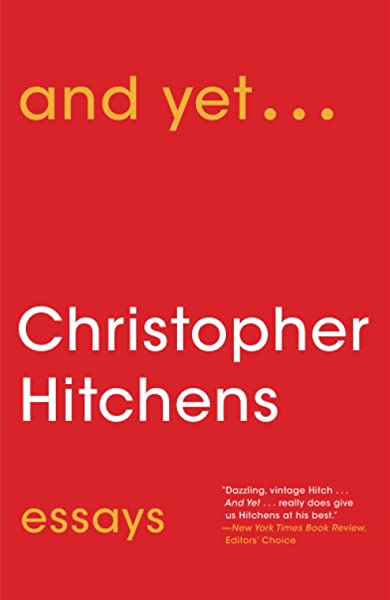Newly released
This book is new and will be uploaded as soon as it becomes available to us and if we secure the necessary publishing rights.

And Yet Book PDF
(0)
Author:
Christopher HitchensNumber Of Reads:
68
Language:
English
Category:
literatureSection:
Pages:
396
Quality:
excellent
Views:
699
Quate
Review
Save
Share
Book Description
And Yet...: Essays
The death of Christopher Hitchens in December 2011 prematurely silenced a voice that was among the most admired of contemporary writers. For more than forty years, Hitchens delivered to numerous publications on both sides of the Atlantic essays that were astonishingly wide-ranging and provocative. The judges for the PEN/Diamonstein-Spielvogel Award for the Art of the Essay, posthumously bestowed on Hitchens, praised him for the way he wrote “with fervor about the books and writers he loved and with unbridled venom about ideas and political figures he loathed.” He could write, the judges went on to say, with “undisguised brio, mining the resources of the language as if alert to every possibility of color and inflection.” He was, as Benjamin Schwarz, his editor at The Atlantic magazine, recalled, “slashing and lively, biting and funny—and with a nuanced sensibility and a refined ear that he kept in tune with his encyclopedic knowledge and near photographic memory of English poetry.” And as Michael Dirda, writing in the Times Literary Supplement, observed, Hitchens “was a flail and a scourge, but also a gift to readers everywhere.”
The author of five previous volumes of selected writings, including the international bestseller Arguably, Hitchens left at his death nearly 250,000 words of essays not yet published in book form. And Yet… assembles a selection that usefully adds to Hitchens’s oeuvre. It ranges from the literary to the political and is, by turns, a banquet of entertaining and instructive delights, including essays on Orwell, Lermontov, Chesterton, Fleming, Naipaul, Rushdie, Pamuk, and Dickens, among others, as well as his laugh-out-loud self-mocking “makeover.” The range and quality of Hitchens’s essays transcend the particular occasions for which they were originally written. Often prescient, always pugnacious, and formidably learned, Hitchens was a polemicist for the ages. With this posthumous volume, his reputation and his readers will continue to grow.
Christopher Hitchens was the cartographer of his own literary and political explorations. He sought assiduously to affirm—and to reaffirm—the ideas of secularism, reason, libertarianism, internationalism, and solidarity, values always under siege and ever in need of defending. Henry James once remarked, “Nothing is my last word on anything.” For Hitchens, as for James, there was always more to be said.
Christopher Hitchens
He is a British-American author, columnist, essayist, orator, literary and religious critic, social critic and journalist. Hitchens was the author, co-author, editor or co-editor of more than 30 books, including five collections of political, cultural, and literary essays. His polemical rhetoric made him a central topic of public discourse, resulting in him as an intellectual and controversial figure. Contributed to New Statesman, The Nation, The Weekly Standard, The Atlantic, London Review of Books, The Times Literary Supplement, Slate, Free Inquiry, and Vanity Fair. Describing himself as a democratic socialist, Marxist and anti-totalitarian, he broke with the political left after describing it as the "lukewarm reaction" of the Western left to the debate over The Satanic Verses, followed by the left's embrace of Bill Clinton and the anti-NATO war movement in Bosnia and Herzegovina in the 1990s.
The last century. His support for the war on Iraq further separated him. His writings included criticism of public figures such as Bill Clinton, Henry Kissinger, Mother Teresa and Diana, Princess of Wales. He was the older brother of conservative journalist and author Peter Hitchens. He also called for the separation of church and state. As a critic of divinity, he regards notions of a deity or a higher power as universalistic beliefs that restrict individual freedom. He advocated freedom of expression and scientific discovery, and that it trumps religion as a moral code of conduct for human civilization. His famous statement, "What can be affirmed without evidence can be denied without evidence" became known as the Hitchens Code.
Book Currently Unavailable
This book is currently unavailable for publication. We obtained it under a Creative Commons license, but the author or publisher has not granted permission to publish it.
Rate Now
5 Stars
4 Stars
3 Stars
2 Stars
1 Stars
And Yet Quotes
Top Rated
Latest
Quate
Be the first to leave a quote and earn 10 points
instead of 3
Comments
Be the first to leave a comment and earn 5 points
instead of 3